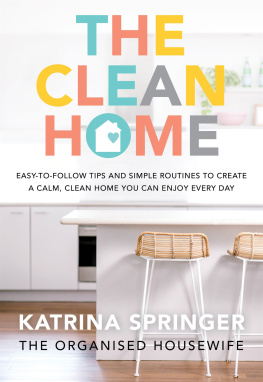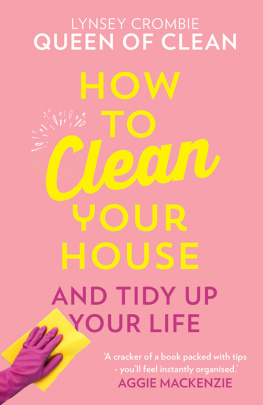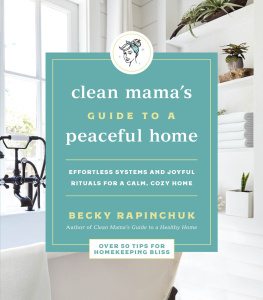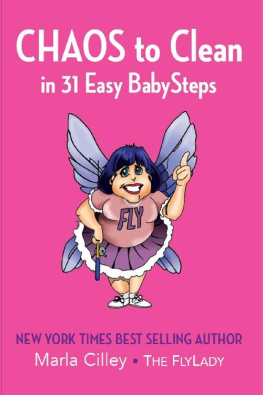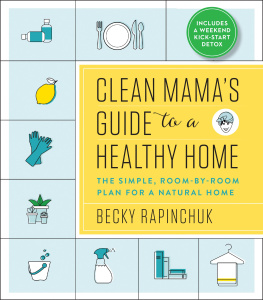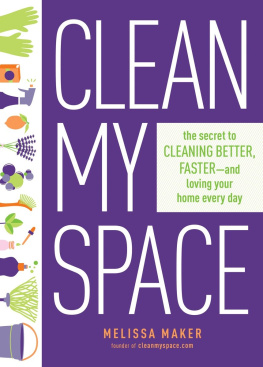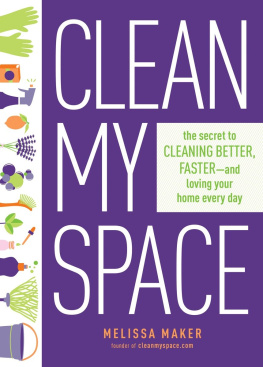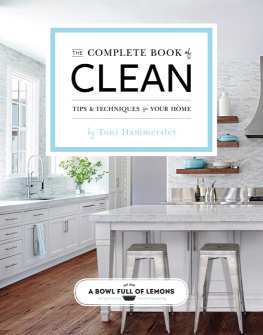



Ill begin with a confession: I havent always been organised. My home always had clutter spots (the dining table was my preferred dumping ground) and I struggled to keep the kitchen clean. I used every pot and utensil when I cooked and usually left the dirty dishes for the following day relaxing seemed much more enticing than cleaning. But when my husband and I welcomed our twin babies in 2003, followed by our youngest daughter just two years later , I realised that I needed to make some changes. I soon discovered that cleaning routines helped to create calm among the chaos and gave me more space and time to enjoy family life. Growing up, I idolised my nan. With seven children (including twins) and 19 grandchildren, she was generous, capable and a proud homemaker . She delighted in keeping a neat, tidy and clean home, and she always had home-made baking waiting for us when we visited. I spent my school holidays with her , crafting, cooking and helping her with housework. I wanted to be just like her . (That said, I rarely kept my room tidy at home I was always getting into trouble for kicking my dirty clothes under the bed!) Sadly, Nan passed away a year after I got married. Later , when my twins were born, I missed her more than ever I had so many questions I wanted to ask her . I am sure she would have given me some excellent heartfelt advice about raising a family and keeping a happy home. Like her mother , my mum was also caring and nurturing, and proud of her home. She was a very organised hoarder and collector , and kept many gorgeous ornaments in a glass cabinet. My memories of her cleaning the house are as clear as yesterday. When Mum cleaned, she meant business. She removed everything from the cupboards, scrubbed from top to bottom, MY STORY MY STORY

THE C L E A N H M E sorted through her things (rarely purging anything), then reorganised as necessary and placed everything back neatly. Mum repurposed old ice-cream containers and fruit boxes to keep everything in their place I know she would have had a eld day with all the items we stock at Organised HQ! These two kind and capable women were a huge inuence on me: Nan with her joy of baking and being surrounded by family; Mum, with her organisation and love of helping others. I married my soulmate Scott when I was 21, and a few months later we purchased our rst home here on the Gold Coast, Queensland. W e s hared our domestic responsibilities. I inherited my nans love of baking and enjoyed cooking delicious mufns and biscuits for Scottys lunch box. I did, however , struggle with keeping everything tidy. I am a messy cook and like to use every saucepan in the kitchen (this hasnt changed, I am still the same in this regard). I often left the dinner dishes for the next day which I always regretted when I came home from work to a dirty sink. The dining table, especially, was my downfall. I would come home and dump the mail, my handbag, lunch bag, shopping everything! on the table, and there it would stay until our weekly cleaning afternoon. Then, at the age of 25, I fell pregnant with twins. For health reasons, I had to stop work in my rst trimester . Homebound, I spent months nesting, organising all the drawers, planning the twins nursery, making sure everything was as orderly and simple as possible for their arrival. I was in my element, thoroughly enjoying the experience of creating a clean, organised home. When our two bundles of absolute sweetness (a girl and a boy) arrived, life and our home was turned upside down. Tw o newborns take up a lot of time. Feeding alone could take a good hour and a half. Then there was the bathing, cuddling, playing, endless settling ... The domestic duties took second place. Loads of washing started to pile up; there was no time to fold the clean clothes. The dishes collected in the sink; I was always too tired to sweep the oors. Clutter crowded every surf ace.

I put on a happy face but deep down I was quietly overwhelmed by how disorganised everything had become. I didnt want to feel like this; it was interf ering with my sense of wellbeing. I knew that in order to nd some calm among all this chaos, I needed to create some routines. Our previous approach of tackling everything in one morning or after noon was no longer achievable, so I split up the things I needed to do and dedicated specic days to certain tasks. Monday Grocery shopping Tue sday Bathroom/general tidy Wedn esday Floors Thursday B edrooms Friday Kitchen Wee kend Var ious household tasks Splitting the workload over specic days meant I could get the jobs done around the home when the twins were sleeping or happily playing. I quickly discovered that routines create structure, which then becomes habit, which automatically puts you in control of the day. Completing tasks that take just a couple of minutes can put you in a positive mindset for the rest of the day. So from that day forward, I have kept to a routine. Two years later , we welcomed our youngest daughter and moved into a new home with room for our growing family. It was a struggle in the early days, but I had a good sleeping, feeding and play routine for the twins, and I managed to work my new baby into the established routine. Of course I had many days when the washing was piling up (both clean and dirty), I didnt have the energy to tidy the house, and the kids just drove me crazy. Being a stay-at-home mum sometimes felt just like groundhog day. Im not ashamed to admit that I would often put the kids in front of the television and have a little cry in my bedroom. MY STORY

THE C L E A N H M E Three kids under three didnt leave much time for a lot, but the routines helped to keep my sanity intact. I found that my emotions were all over the place when the house was a mess, but when our home was tidy, I was much calmer . I also realised that I felt happy enough when the home was tidy and semi-clean; perf ectly clean was impossible at that stage of my life. It was and still is all about balance and routine. I was beginning to work out what helped my mood and wellbeing, and learning to embrace imper fec tly perf ect standards (I write more about this on page ). For example, I realised that waking up to a dirty kitchen made me cranky and that was a terrible way to start the day. Knowing this, I made sure that I cleaned the kitchen before bed, and this always took priority over other tasks, such as folding the clean washing. With these compromises in place, I found my happy spot. Accepting that imperf ectly perf ect was good enough allowed me to be more productive, spend more time with the family and, importantly, look after myself. We a ll get so busy, and a lot of the time we put everyone else before ourselves. But self-care, be it a walk alone, a new haircut or keeping on top of medical checks, is absolutely vital. Please do not put your health at the bottom of the list. Being imperf ectly perf ect gives you more time to check in with yourself. Routines, compromises and self-care all helped to create a happy, clean and calm home when the kids were little. When our youngest daughter started school, I spent some time reecting on the early days of motherh ood and I thought of the conversations Id had at mothers group. I remember asking the other parents things like, How do you keep on top of your washing? and Do you have any good recipes? Im stuck in a rut. I was reaching out to see if other mums had the same issues as me and if they had any solutions. Sadly, no one admitted they might be struggling on this front too, which at the time made me feel like I was doing something wrong. One on one, we would talk about our troubles, but not in a group setting. It was like no one wanted to admit openly that they needed a bit of help.

